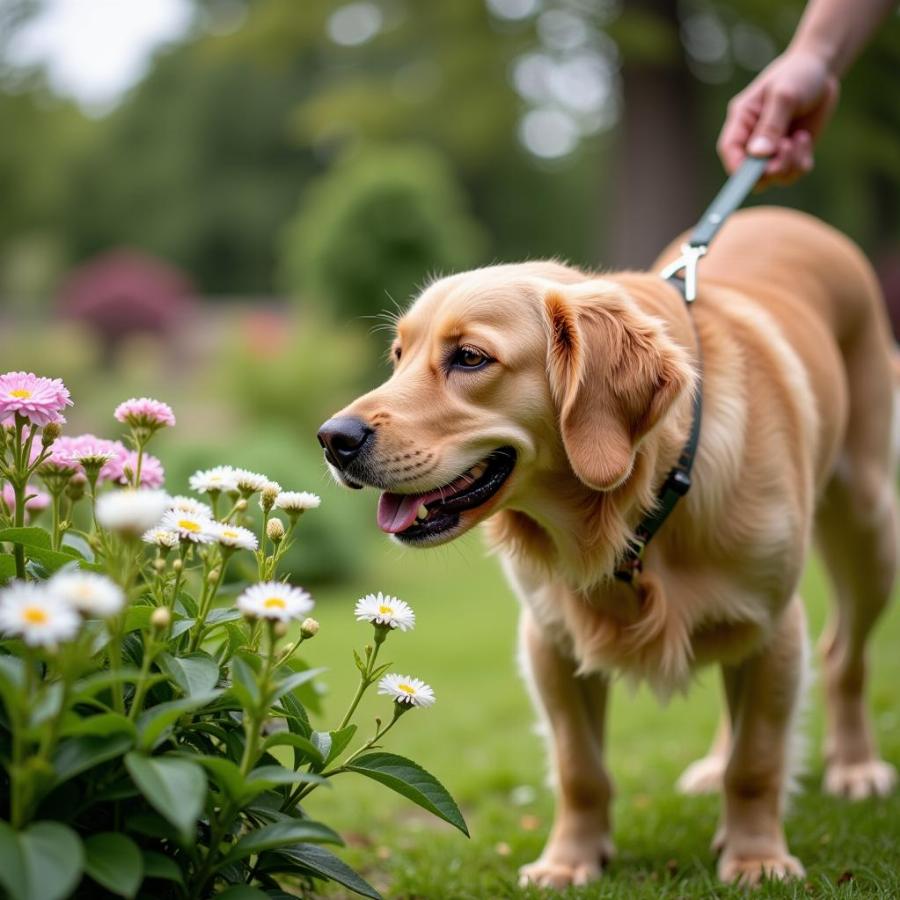Loud breathing in dogs can range from a simple snort to heavy panting or wheezing. While some noisy breathing is normal, especially after exercise or in brachycephalic breeds (those with short noses), it can also be a sign of a more serious health issue. This article explores the common reasons why your dog might be breathing loudly, how to distinguish normal from abnormal breathing, and when it’s crucial to seek veterinary attention.
Normal vs. Abnormal Loud Breathing in Dogs
Understanding the difference between normal and abnormal loud breathing in your dog can be tricky. Is it just a playful snort or something more concerning? Sometimes, loud breathing is simply part of a dog’s natural behavior, like the adorable snorts and snuffles of a happy pup exploring the garden.  Dog exploring the garden Other times, increased respiratory noises are expected, such as panting after a vigorous game of fetch or on a hot day. However, loud breathing that is persistent, accompanied by other symptoms like coughing, difficulty breathing, or changes in behavior, warrants further investigation.
Dog exploring the garden Other times, increased respiratory noises are expected, such as panting after a vigorous game of fetch or on a hot day. However, loud breathing that is persistent, accompanied by other symptoms like coughing, difficulty breathing, or changes in behavior, warrants further investigation.
Common Causes of Loud Breathing in Dogs
Several factors can contribute to loud breathing in dogs. Brachycephalic breeds, like Bulldogs and Pugs, are prone to noisy breathing due to their narrowed airways. Allergies, infections, and respiratory issues like kennel cough or pneumonia can also cause loud breathing, often accompanied by coughing or wheezing. Obesity can restrict a dog’s breathing, leading to increased respiratory effort and noise. Even something as simple as a foreign object lodged in the nasal passages can lead to loud breathing and sneezing.
Brachycephalic Breeds and Respiratory Issues
Brachycephalic dogs often experience stertor, a snoring-like sound, due to their shortened nasal passages and elongated soft palate. This can make breathing more challenging, especially during exercise or in hot weather. If your brachycephalic dog is breathing excessively loudly, even at rest, consult your veterinarian.
Allergies and Respiratory Infections
Allergies can cause inflammation in the airways, leading to sneezing, coughing, and loud breathing. Respiratory infections like kennel cough and pneumonia can also cause similar symptoms, often accompanied by a discharge from the nose or eyes. It’s essential to seek veterinary care if your dog exhibits these signs.
When to Seek Veterinary Care for Dog Breathing Loud
While occasional loud breathing isn’t always a cause for alarm, certain situations require immediate veterinary attention. If your dog’s breathing becomes suddenly labored, if they’re struggling to breathe, or if their gums turn blue or pale, seek emergency care. These can be signs of a life-threatening condition. Similarly, persistent coughing, wheezing, or changes in behavior accompanied by loud breathing should be addressed by a veterinarian.
Recognizing Emergency Situations
Knowing how to recognize an emergency can save your dog’s life. If your dog is gasping for air, collapsing, or exhibiting extreme distress, don’t hesitate to seek immediate veterinary help.
Tips for Managing Loud Breathing in Dogs
Depending on the cause, several strategies can help manage loud breathing in dogs. Maintaining a healthy weight, avoiding strenuous exercise in hot weather, and using a harness instead of a collar can ease breathing difficulties. For allergies, your veterinarian might recommend medications or environmental modifications.
Conclusion
Loud breathing in dogs can be a normal occurrence or a symptom of an underlying health issue. By understanding the potential causes and recognizing the signs of respiratory distress, you can ensure your furry friend receives the appropriate care. Remember, if you’re ever concerned about your dog’s breathing, it’s always best to consult with a veterinarian.
FAQ
-
Is it normal for my dog to snort sometimes? Yes, occasional snorting can be a normal part of a dog’s behavior, especially when they’re excited or exploring.
-
Why is my brachycephalic dog always breathing loudly? Brachycephalic breeds have narrowed airways, making breathing more challenging and often noisy.
-
When should I be worried about my dog’s loud breathing? If the loud breathing is persistent, accompanied by other symptoms, or if your dog seems to be struggling to breathe, seek veterinary attention.
-
What can I do to help my dog breathe easier? Maintaining a healthy weight, avoiding strenuous exercise in hot weather, and using a harness can help.
-
Can allergies cause loud breathing in dogs? Yes, allergies can cause inflammation in the airways, leading to loud breathing, coughing, and sneezing.
You might also be interested in:
my dog is acting scared and shaking discusses reasons why your dog may be displaying fear and anxiety. This can be helpful if your dog’s loud breathing is accompanied by behavioral changes. If you suspect your dog’s loud breathing may be related to a nasal issue, dog dry nose not eating can provide insights into other nasal symptoms and related concerns.
Beaut Dogs is your trusted source for all things dog-related, providing expert advice and information to help you care for your canine companion. From breed information to health and training tips, Beaut Dogs is dedicated to helping you provide the best possible care for your furry friend. When you need professional guidance, feel free to contact us at Email: [email protected] for detailed and accurate answers.